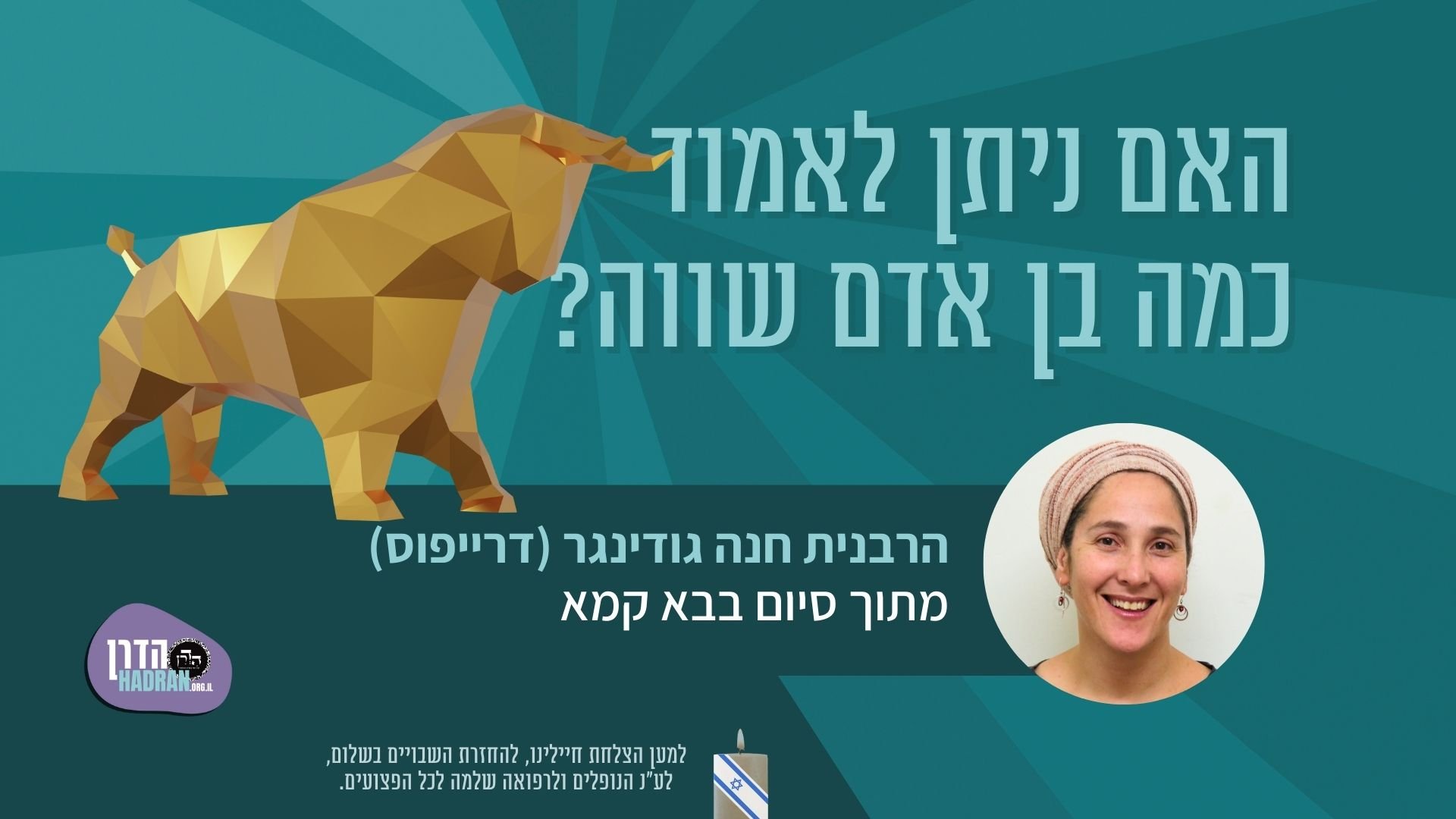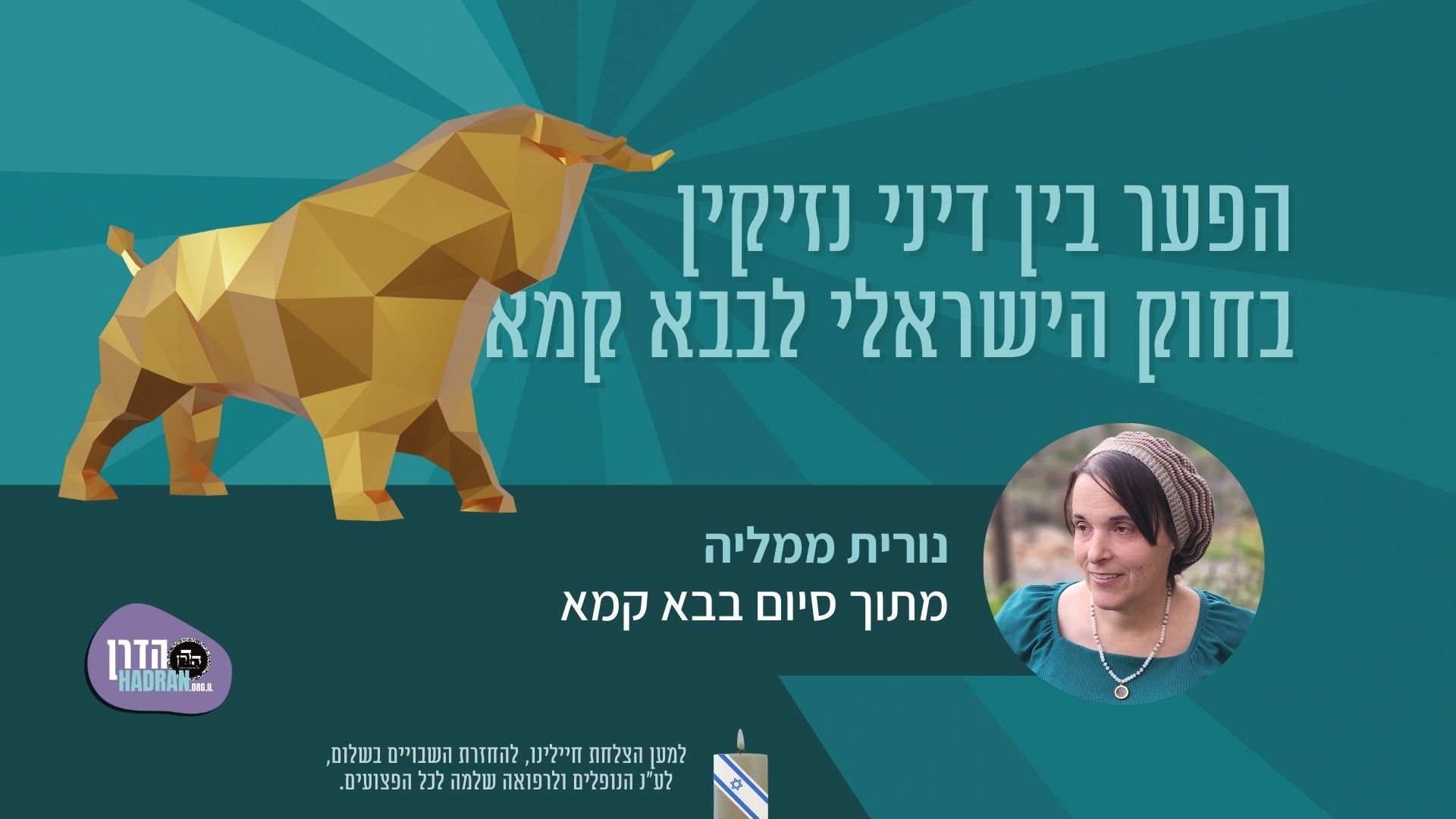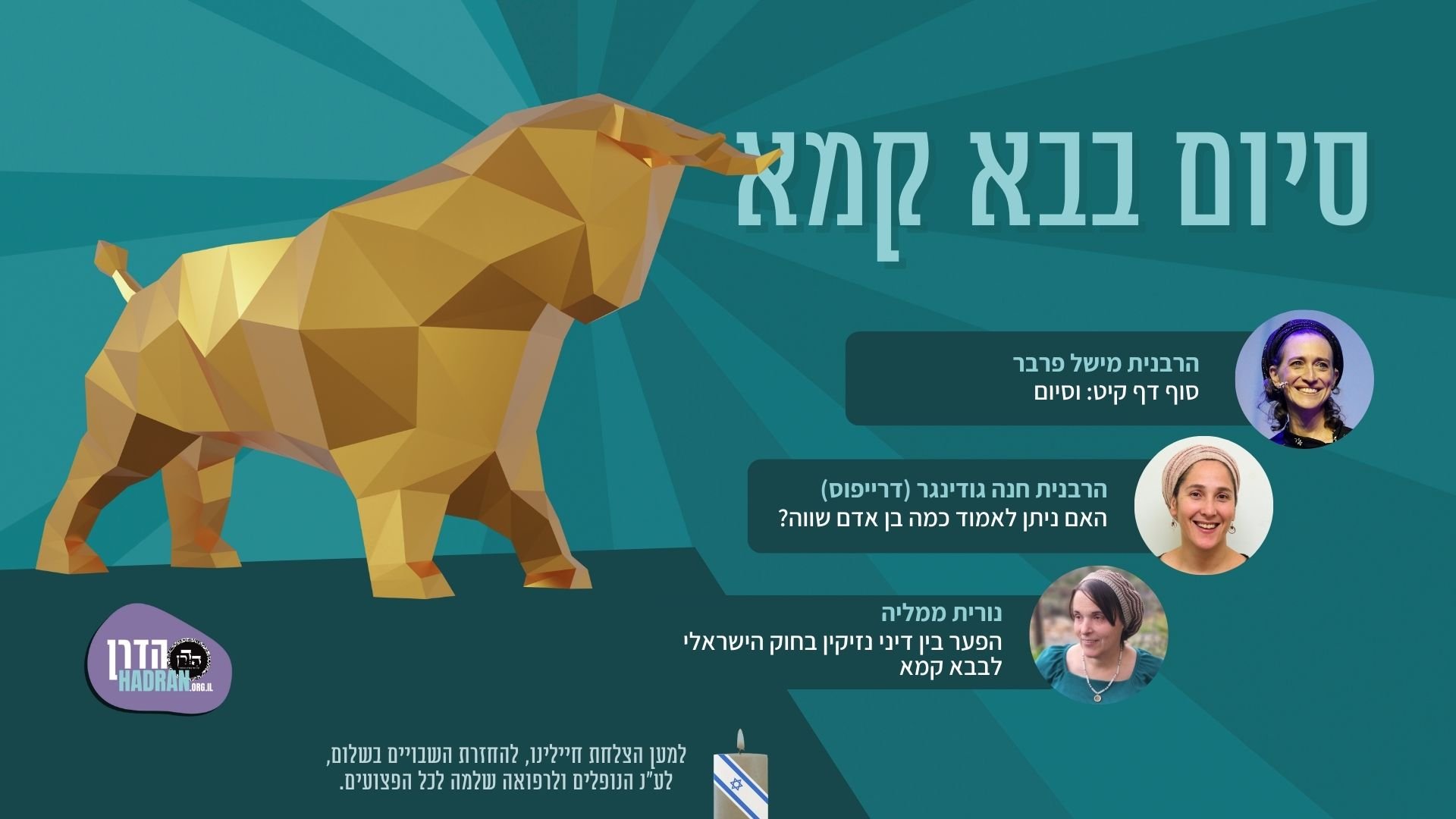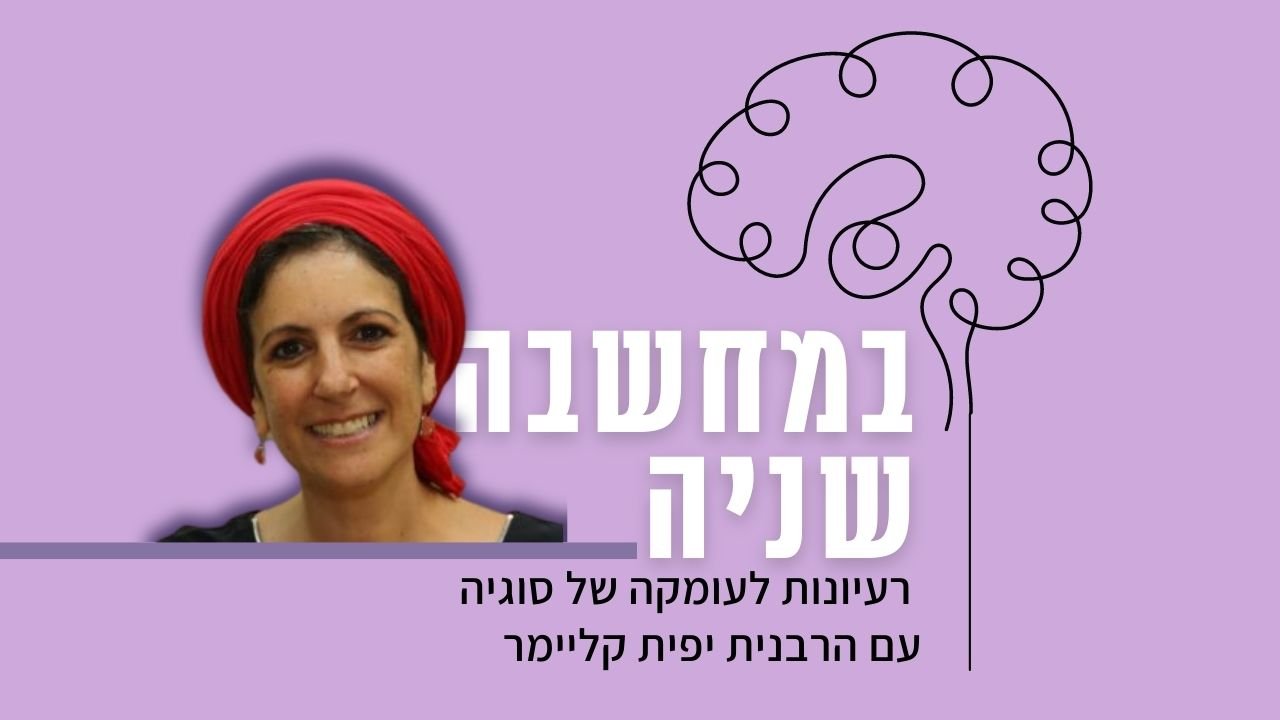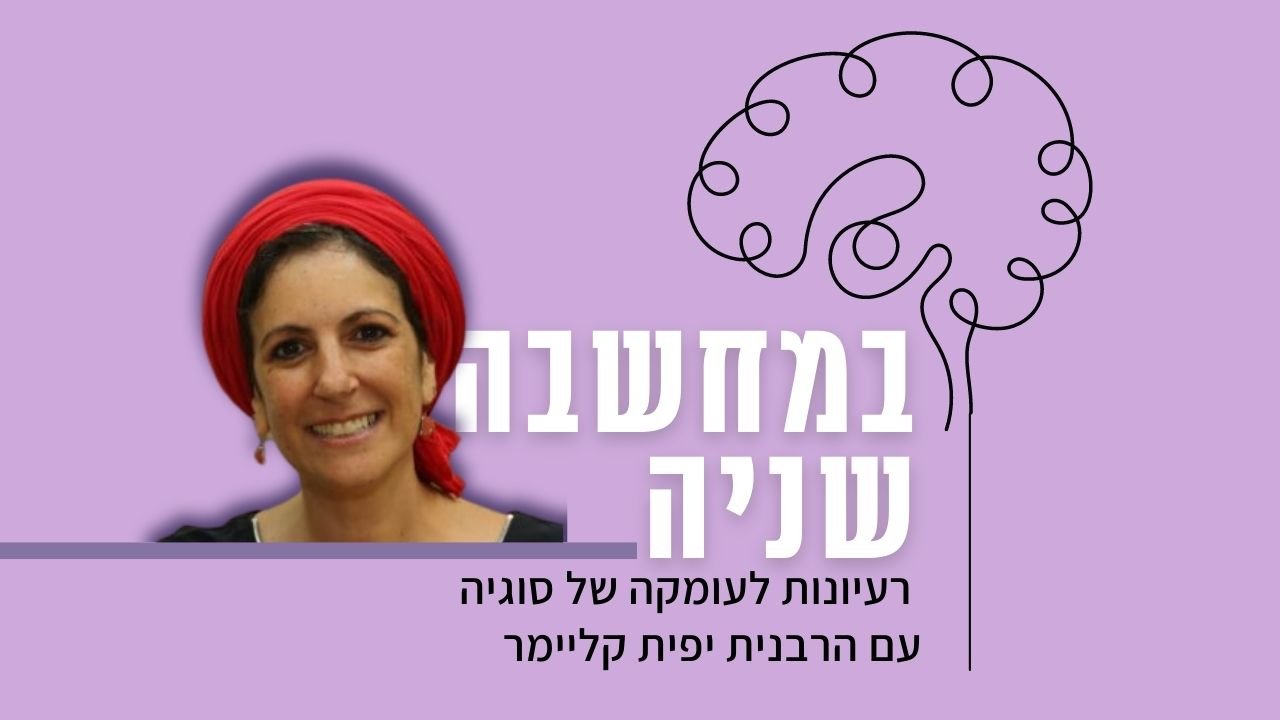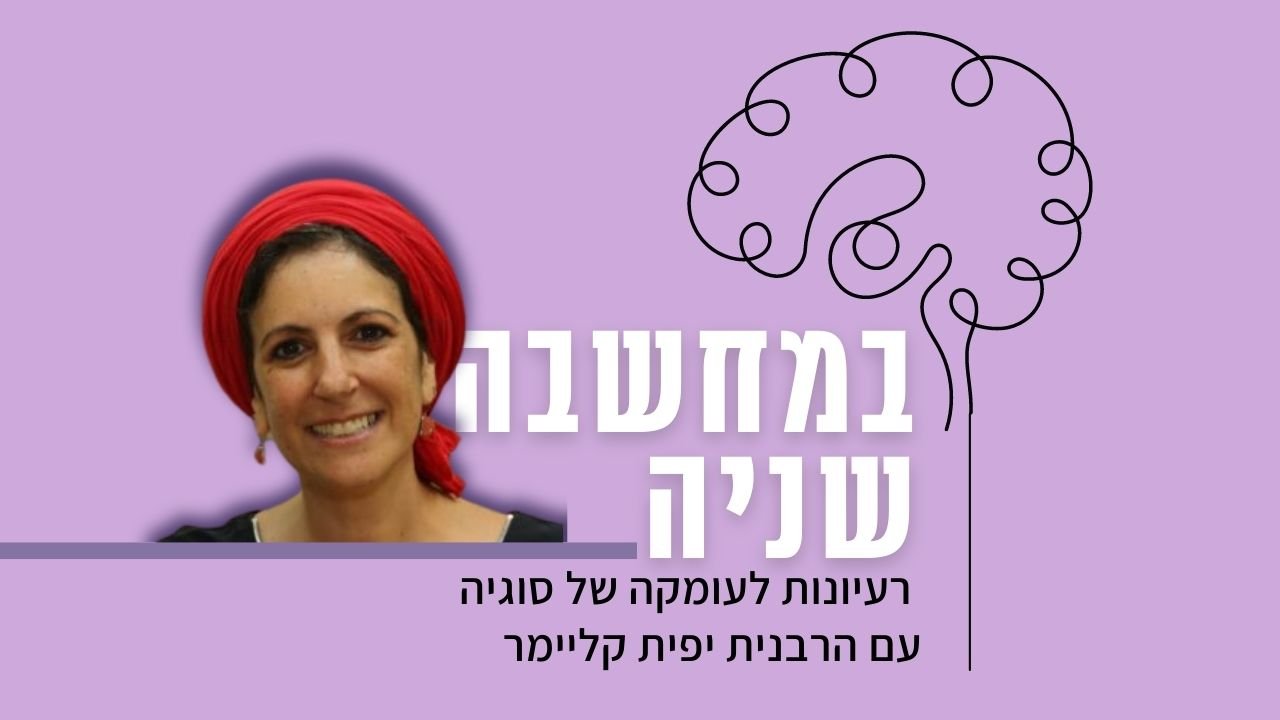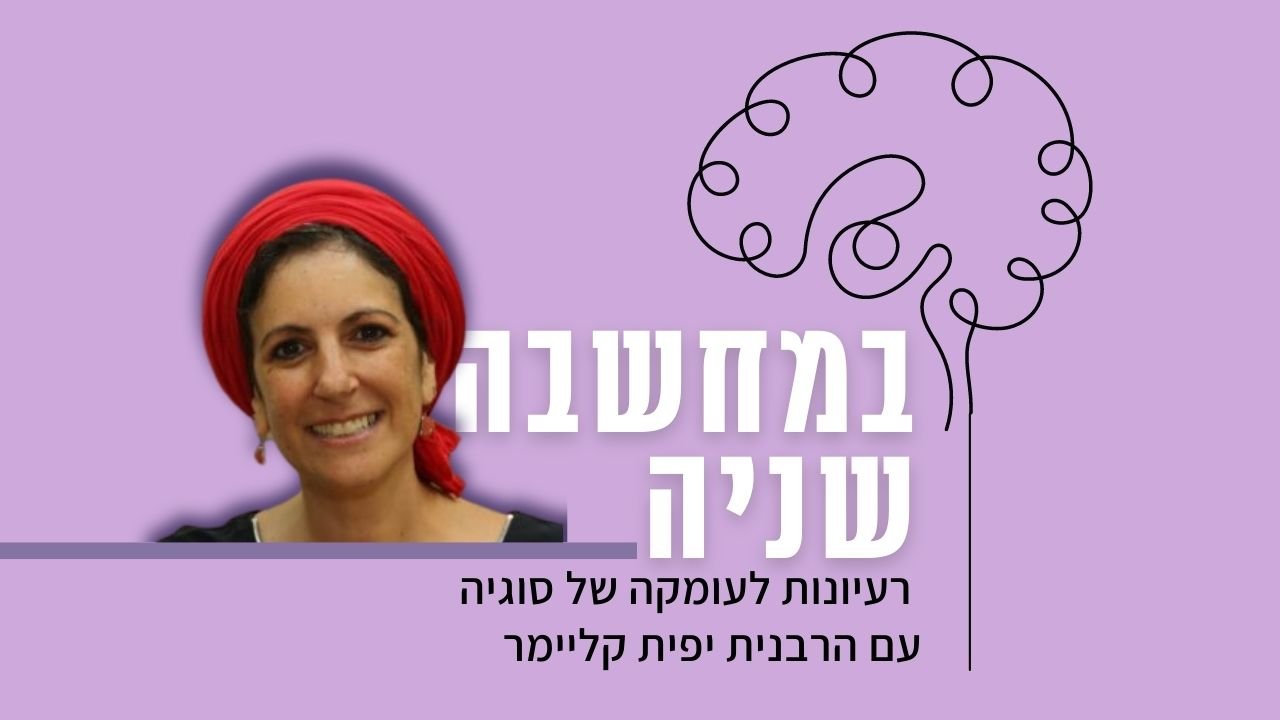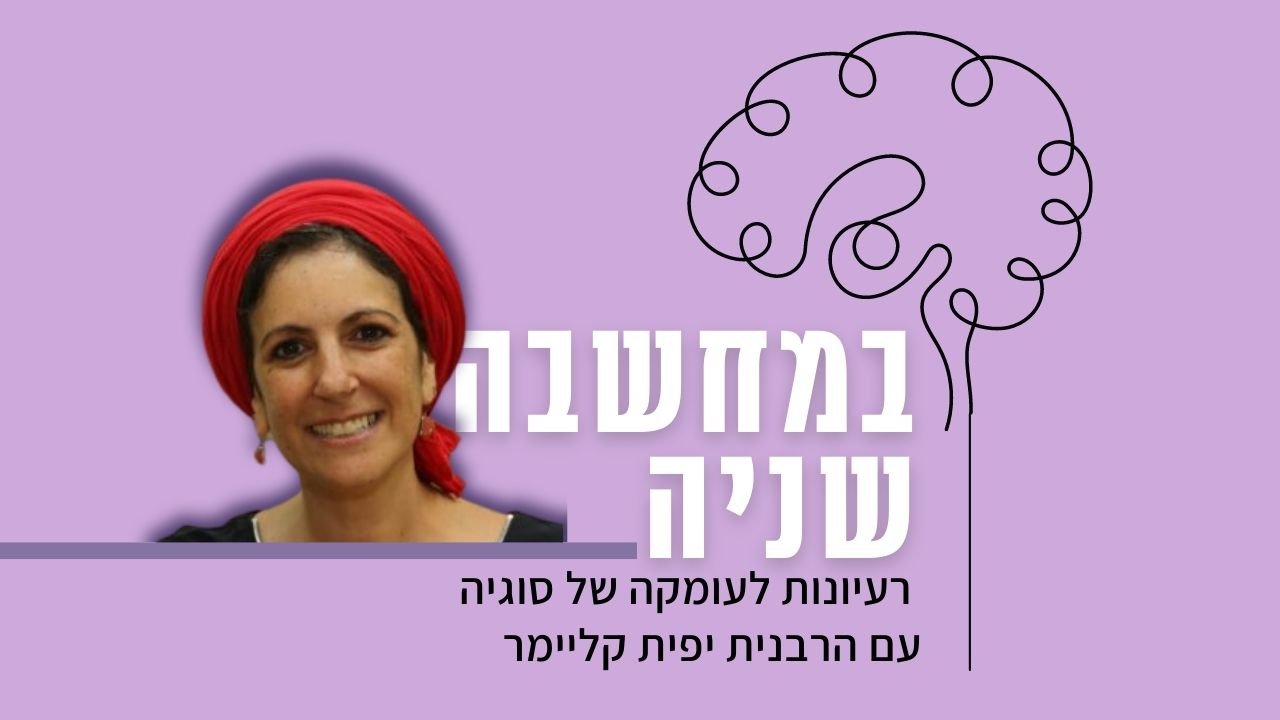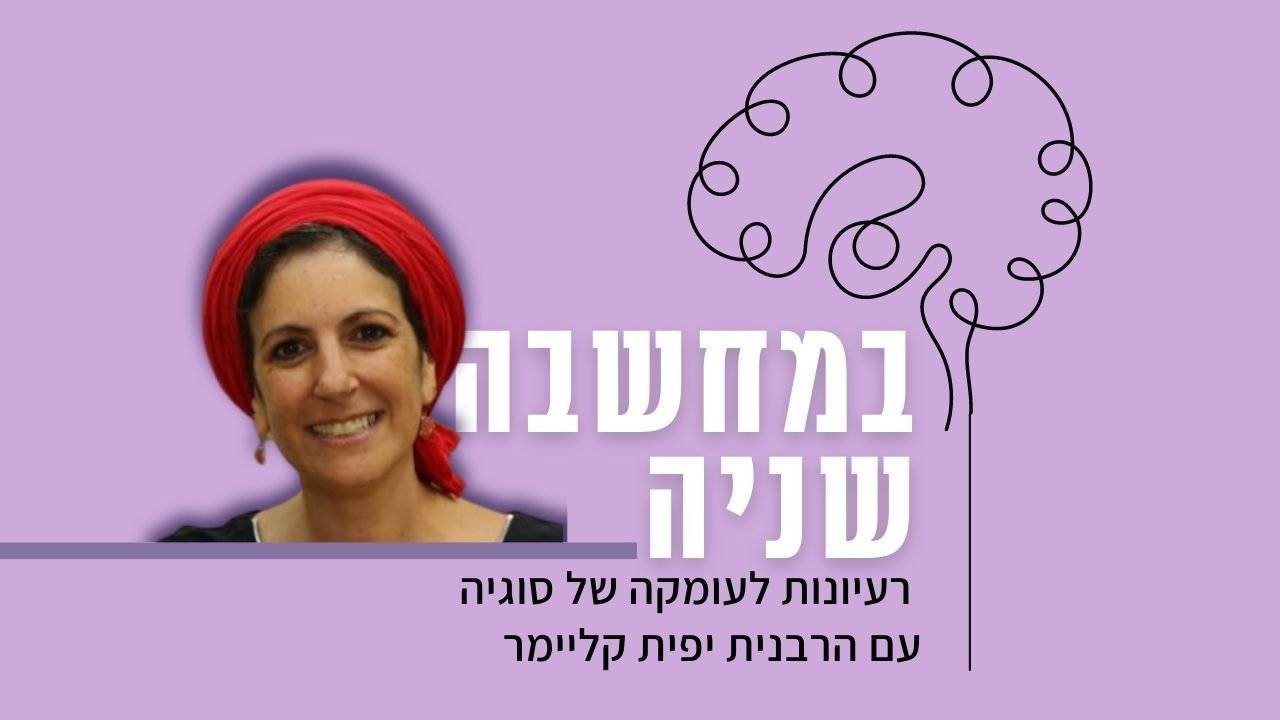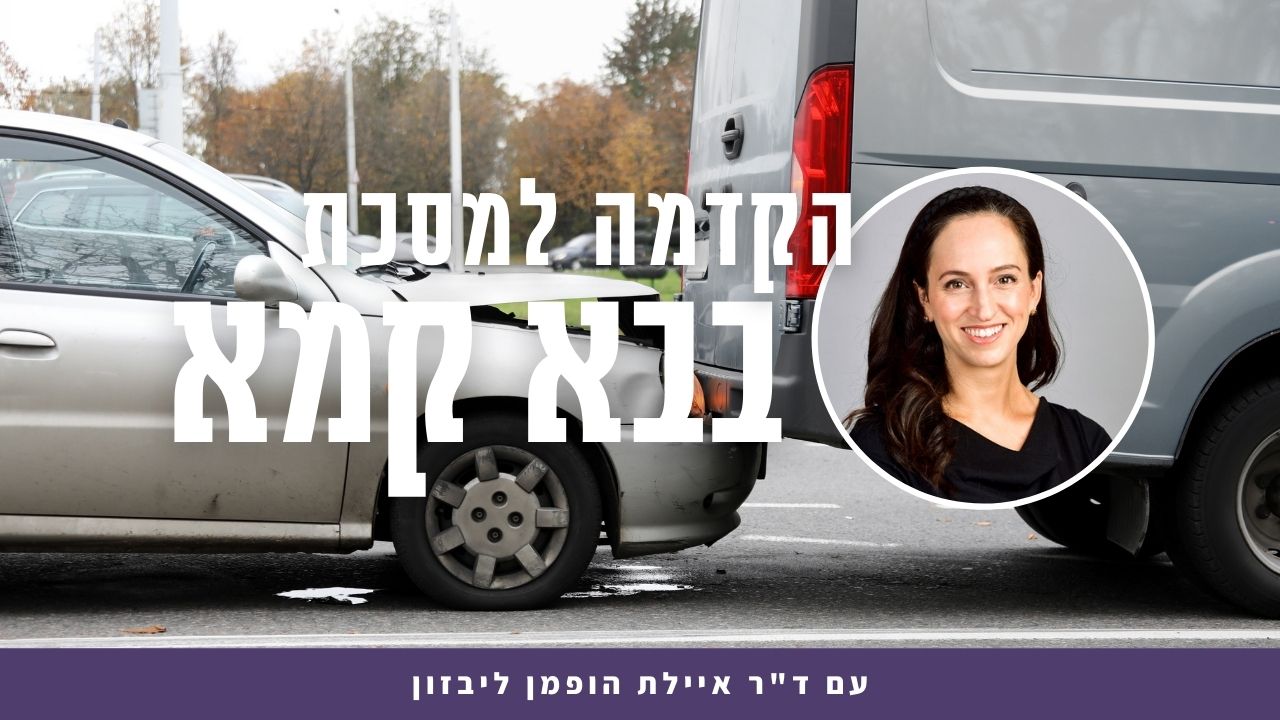למה התכוון רבי עקיבא ב”קל וחומר להקדש”. כיצד נוכל להיות בטוחים שרבי עקיבא חולק על רבי ישמעאל בשאלה האם ה-מיטב שדהו מוערכת על פי הניזק או המזיק? אביי מעלה סתירה – מצד אחד ברור שצריך לשלם ממיטב הקרקע. מצד שני יש ברייתא הקובעת שאפשר אפילו לשלם מסובין. מובאות ארבע תשובות אפשריות – שלוש הראשונות נדחות. לדברי רבי עקיבא, אנו מעריכים לפי מיטב שדהו של המזיק. האם זה אובייקטיבי (מבוסס על העידית בעולם בכלל) או סובייקטיבי (מבוסס על עידית המזיק)?
הלימוד החודש מוקדש לרפואת פיליס הכט, גיטל פעשא בת מאשה רחל על ידי חברותיה הרבות שאוהבות ומעריכות אותה.
רוצה להקדיש שיעור?

כלים
הלימוד החודש מוקדש לרפואת פיליס הכט, גיטל פעשא בת מאשה רחל על ידי חברותיה הרבות שאוהבות ומעריכות אותה.
כלים
העמקה
רוצה להבין מה באמת קורה מתחת לפני השטח של הסוגיה?
שיעורים, פודקאסטים והרחבות של מיטב המורות שלנו יפתחו לך עוד זוויות וכיווני חשיבה.
חדשה בלימוד הגמרא?
זה הדף הראשון שלך? איזו התרגשות עצומה! יש לנו בדיוק את התכנים והכלים שיעזרו לך לעשות את הצעדים הראשונים ללמידה בקצב וברמה שלך, כך תוכלי להרגיש בנוח גם בתוך הסוגיות המורכבות ומאתגרות.
פסיפס הלומדות שלנו
גלי את קהילת הלומדות שלנו, מגוון נשים, רקעים וסיפורים. כולן חלק מתנועה ומסע מרגש ועוצמתי.
בבא קמא ז
וּבַעַל חוֹב בְּבֵינוֹנִית!
and the halakha of a creditor is to collect only from intermediate-quality land, not from superior-quality land.
וְכִי תֵּימָא סָבַר רַבִּי עֲקִיבָא: בַּעַל חוֹב נָמֵי בְּעִידִּית; אִיכָּא לְמִיפְרַךְ: מָה לְבַעַל חוֹב – שֶׁכֵּן יִפָּה כֹּחוֹ בְּנִזָּקִין, תֹּאמַר בְּהֶקְדֵּשׁ – שֶׁהוֹרַע כֹּחוֹ בְּנִזָּקִין!
And if you would say that Rabbi Akiva holds that a creditor can collect the money owed him from superior-quality land as well, there is still a difficulty; the a fortiori inference can still be refuted in the following manner: What is notable about an ordinary creditor? He is notable in that the Torah enhanced his power with regard to payment of damages, as an ordinary person can collect payment of damages for loss or injury caused by another’s ox. But can you say the same about the Temple treasury of consecrated property, with regard to which the Torah weakened its power with regard to payment of damages, not allowing it to collect such compensation? Accordingly, even if a creditor collects from superior-quality land, it does not necessarily follow that a Temple treasurer would also do so. It is therefore apparent that Rabbi Akiva’s a fortiori inference is not referring to the case of one who donates money to the Temple.
לְעוֹלָם דִּנְגַח תּוֹרָא דִידַן לְתוֹרָא דְהֶקְדֵּשׁ. וּדְקָא קַשְׁיָא לָךְ: ״שׁוֹר רֵעֵהוּ״ אָמַר רַחֲמָנָא – וְלֹא שׁוֹר שֶׁל הֶקְדֵּשׁ; רַבִּי עֲקִיבָא סָבַר לַהּ כְּרַבִּי שִׁמְעוֹן בֶּן מְנַסְיָא –
The Gemara rejects this: Actually, we can explain that we are dealing here with a case where our ox gored an ox that is consecrated property. And with regard to that which posed a difficulty for you about this explanation, i.e., that the Merciful One states: “The ox of another” (Exodus 21:35), which indicates that liability is incurred only for damaging another person’s ox but not for an ox consecrated to the Temple, Rabbi Akiva disagrees with that interpretation and holds in accordance with the opinion of Rabbi Shimon ben Menasya.
דְּתַנְיָא, רַבִּי שִׁמְעוֹן בֶּן מְנַסְיָא אוֹמֵר: שׁוֹר שֶׁל הֶקְדֵּשׁ שֶׁנָּגַח שׁוֹר שֶׁל הֶדְיוֹט – פָּטוּר; שׁוֹר שֶׁל הֶדְיוֹט שֶׁנָּגַח שׁוֹר שֶׁל הֶקְדֵּשׁ, בֵּין תָּם בֵּין מוּעָד – מְשַׁלֵּם נֶזֶק שָׁלֵם.
As it is taught in a baraita: Rabbi Shimon ben Menasya says: If an ox that is consecrated property gored an ox belonging to a common person [hedyot], the Temple treasury is exempt from liability. By contrast, in the case of an ox belonging to a common person that gored an ox that is consecrated property, whether the ox that gored the other ox was an innocuous ox, i.e., an ox with no consistent history of causing damage with the intent to injure, or it was a forewarned ox, i.e., an ox whose owner was forewarned because his ox had already gored another ox three times, the ox’s owner pays the full cost of the damage.
אִי הָכִי, רַבִּי יִשְׁמָעֵאל וְרַבִּי עֲקִיבָא – מִמַּאי דִּבְעִידִּית דְּנִיזָּק וְזִיבּוּרִית דְּמַזִּיק פְּלִיגִי? דִּלְמָא דְּכוּלֵּי עָלְמָא בִּדְנִיזָּק שָׁיְימִינַן, וְהָכָא בִּפְלוּגְתָּא דְּרַבִּי שִׁמְעוֹן בֶּן מְנַסְיָא וְרַבָּנַן קָמִפַּלְגִי –
The Gemara asks: If so, from where do you know to say that Rabbi Akiva and Rabbi Yishmael disagree about a case where the superior-quality land belonging to the injured party and the inferior-quality land belonging to the one liable for the damage are equal in quality, and the one liable for the damage also has land of superior quality, as the dispute was previously interpreted by Rav Aḥa bar Ya’akov? Perhaps everyone, including Rabbi Akiva, agrees that we appraise the value of the land of the injured party, and here they disagree with regard to the dispute between Rabbi Shimon ben Menasya and the Rabbis.
רַבִּי עֲקִיבָא סָבַר כְּרַבִּי שִׁמְעוֹן בֶּן מְנַסְיָא, וְרַבִּי יִשְׁמָעֵאל סָבַר כְּרַבָּנַן!
The Gemara explains: Rabbi Akiva holds in accordance with the opinion of Rabbi Shimon ben Menasya, that in the case of damage caused by the ox of a common person to the property of the Temple treasury, compensation is collected from superior-quality land belonging to the one liable for the damage. And Rabbi Yishmael holds in accordance with the opinion of the Rabbis, that the owner of the ox bears no liability. In other words, perhaps in the baraita recording the dispute between Rabbi Yishmael and Rabbi Akiva (see 6b), Rabbi Yishmael first taught that land is appraised based on the quality of the injured party’s land, and then, although it is not explicit in the baraita, he continued to state his opinion that the Temple treasury is unable to collect damages. Accordingly, Rabbi Akiva can be understood as having first expressed his agreement concerning the valuation of land and then proceeding to dispute Rabbi Yishmael’s opinion with regard to the Temple treasury.
אִם כֵּן, מַאי ״לֹא בָּא הַכָּתוּב״?
The Gemara rejects this suggestion: If it is so that this is the disagreement, then what is the meaning of Rabbi Akiva’s statement: The verse comes only to allow injured parties to collect compensation from superior-quality land? This indicates that Rabbi Akiva disagrees about how to understand this verse.
וְעוֹד, מַאי ״קַל וָחוֹמֶר לַהֶקְדֵּשׁ״?
And furthermore, if the subject is the Temple treasury, what is the meaning of: And by means of an a fortiori inference one can derive that the Temple treasury of consecrated property collects from superior-quality land. If, as suggested, Rabbi Akiva holds in accordance with the opinion of Rabbi Shimon ben Menasya, then he maintains that damage to consecrated property is dealt with more stringently than damage to another person’s property, in that if one’s ox damages consecrated property one is liable for the full cost of the damage even if the ox was considered innocuous. If damage to consecrated property is dealt with more stringently, there is no basis to derive an a fortiori inference.
וְעוֹד, הָא אָמַר רַב אָשֵׁי, תַּנְיָא בְּהֶדְיָא: ״מֵיטַב שָׂדֵהוּ וּמֵיטַב כַּרְמוֹ יְשַׁלֵּם״ – מֵיטַב שָׂדֵהוּ שֶׁל נִיזָּק, וּמֵיטַב כַּרְמוֹ שֶׁל נִיזָּק, דִּבְרֵי רַבִּי יִשְׁמָעֵאל. רַבִּי עֲקִיבָא אוֹמֵר: מֵיטַב שָׂדֵהוּ שֶׁל מַזִּיק, וּמֵיטַב כַּרְמוֹ שֶׁל מַזִּיק.
And furthermore, didn’t Rav Ashi say: It is taught explicitly in a baraita: The verse: “The best of his field and the best of his vineyard he shall pay” (Exodus 22:4), teaches that the appraisal is of the best of the field of the injured party, and of the best of the vineyard of the injured party. This is the statement of Rabbi Yishmael. Rabbi Akiva says: The appraisal is of the best of the field of the one liable for the damage, and of the best of the vineyard of the one liable for the damage. This clearly indicates that according to Rabbi Akiva compensation is collected from the superior-quality land belonging to the one liable for the damage.
רָמֵי לֵיהּ אַבָּיֵי לְרָבָא, כְּתִיב: ״מֵיטַב שָׂדֵהוּ וּמֵיטַב כַּרְמוֹ יְשַׁלֵּם״ – מֵיטַב אִין, מִידֵּי אַחֲרִינָא לָא;
§ The Gemara considers others issues concerning the form in which restitution should be paid: Abaye raises a contradiction and addresses it to Rava: It is written: “The best of his field and of the best of his vineyard he shall pay” (Exodus 22:4), which indicates that from his best-quality land, yes, he shall pay, but from something else, no, he shall not pay.
וְהָתַנְיָא: ״יָשִׁיב״ – לְרַבּוֹת שָׁוֶה כֶּסֶף, וַאֲפִילּוּ סוּבִּין!
But isn’t it taught in a baraita: The verse states: “And if a man shall open a pit, or if a man shall dig a pit and not cover it, and an ox or a donkey fall therein, the owner of the pit shall pay; he shall recompense money to its owners” (Exodus 21:33–34)? Since the verse states: “The owner of the pit shall pay,” the additional term “he shall recompense” is superfluous. It therefore serves to include any item worth money, and even bran, a relatively inferior commodity, as valid forms of restitution.
לָא קַשְׁיָא; כָּאן מִדַּעְתּוֹ, כָּאן בְּעַל כׇּרְחוֹ.
Rava resolves the contradiction: This is not difficult. Here, the term “he shall recompense” is referring to a case where he pays of his own volition, without being taken to court, and he may therefore use any form of payment. There, the phrase “of the best of his field” is referring to a case where he pays against his will, after the injured party has sued him in court. Since he caused the injured party additional trouble, he must pay using his best-quality land.
אָמַר עוּלָּא בְּרֵיהּ דְּרַב עִילַּאי: דַּיְקָא נָמֵי, דִּכְתִיב: ״יְשַׁלֵּם״ – בְּעַל כׇּרְחוֹ.
Ulla, son of Rav Ilai, said: According to this explanation, the language of the verse is also precise, as it is written: “He shall pay,” a term that, as opposed to: “He shall recompense,” connotes that he is forced to pay against his will.
אֲמַר לֵיהּ אַבָּיֵי: מִי כְּתִיב ״יְשׁוּלַּם״?! ״יְשַׁלֵּם״ כְּתִיב – מִדַּעְתּוֹ מַשְׁמַע!
Abaye said to him that the precise meaning of the verse does not indicate that he is paying against his will: Is it written: He shall be paid, in the passive form, which would clearly indicate that he did not voluntarily initiate the payment himself but rather is paying against his will? No; “he shall pay” is written, which can also indicate that he pays of his own volition.
אֶלָּא אָמַר אַבָּיֵי: כִּדְמָר – דְּתַנְיָא: הֲרֵי שֶׁהָיוּ לוֹ בָּתִּים שָׂדוֹת וּכְרָמִים, וְאֵינוֹ מוֹצֵא לְמוֹכְרָן – מַאֲכִילִין אוֹתוֹ מַעְשַׂר עָנִי, עַד מֶחֱצָה.
Rather, Abaye said an alternative resolution, similar to that with which the Master, i.e., Abaye’s teacher, Rabba, employed in order to resolve a different difficulty. As it is taught in a baraita: A wealthy person is not entitled to take a poor man’s tithe. He is instead expected to sell his assets and purchase food with the proceeds. But in the case of an individual who owns houses, fields, and vineyards, but at the present time cannot find buyers to whom he can sell them, one may feed him with food from the poor man’s tithe up until half the value of his assets.
וְהָוֵי בָּהּ מָר: הֵיכִי דָמֵי? אִי (הוּזַל) [דְּזוּל] אַרְעָתָא דְּכוּלֵּי עָלְמָא, וְדִידֵיהּ נָמֵי זָל בַּהֲדַיְיהוּ – אֲפִילּוּ טוּבָא נָמֵי לִיסְפֵּי לֵיהּ, דְּהָא זוּל דְּכוּלֵּי עָלְמָא נָמֵי!
And the Master discussed it and asked: What are the circumstances that led to him being unable to sell his land? If everyone’s land depreciated in value, and his land also depreciated along with theirs, let us provide him with even more than half the value of his assets, as, since everyone’s land also depreciated, the market value of his property is low and he is genuinely classified as a poor person, who may take as much poor man’s tithe as is given to him.
אֶלָּא דְּאוֹקִיר אַרְעָתָא דְּכוּלֵּי עָלְמָא, וְדִידֵיהּ – אַיְּידֵי דְּעָיֵיל וְנָפֵיק אַזּוּזֵי, זָל אַרְעֵיהּ?
Rather, it must be that everyone else’s land appreciated in value, and with regard to his land, since people see that he goes in and goes out for money, i.e., he is in need of money, they reason that he will be forced to accept a lower offer for his property. Consequently, his land depreciated in value.
אֲפִילּוּ פּוּרְתָּא נָמֵי לָא לִיסְפּוֹ לֵיהּ!
The Gemara asks: But if that is the case, we should not provide him with even a slight amount of poor man’s tithe. Since his assets, based on their market value, have a high value, he is not to be classified as a poor person.
וְאָמַר מָר עֲלַהּ: לָא צְרִיכָא; דִּבְיוֹמֵי נִיסָן יָקְרָא אַרְעָתָא, וּבְיוֹמֵי תִּשְׁרֵי זָל אַרְעָתָא;
And the Master, Rabba, said concerning this: No, the halakha that he is provided with only up to half the value of his assets is necessary in a case where he cannot sell due to seasonal fluctuations in price. This is because in the days of the month of Nisan, which is the beginning of the harvest season, the market value of land appreciates, and in the days of the month of Tishrei, a time when the harvest had already been reaped and it is too late to prepare the land for the coming year, the market value of land depreciates.
דְּכוּלֵּי עָלְמָא – נָטְרִי עַד נִיסָן, וּמְזַבְּנִי; וְהַאי, הוֹאִיל וְאִצְטְרִיכָא לֵיהּ זוּזֵי – זָבֵין כִּדְהַשְׁתָּא. עַד פַּלְגָא – אוֹרְחֵיהּ לְמֵיזַל, טְפֵי – לָאו אוֹרְחֵיהּ לְמֵיזַל.
Consequently, everyone generally waits until Nisan and sells only at that point. But this person, since he is in need of money, sells his land in Tishrei according to the current, lower, market price. Accordingly, based on the current market prices, his assets have a low value and there is justification in regarding him as a poor person. Yet, since if he waited until Nisan, as everyone else does, his land would have a high value, he cannot truly be classified as a poor person. Therefore, he is permitted to take only as much poor man’s tithe as will cover his losses. The Gemara explains why he is permitted to take only up to half the value of his land: Since it is the nature of land to depreciate up to half its value, and it is not its nature to depreciate more than that, he is entitled to take poor man’s tithe that is worth up to half the value of his land and the rest he can supplement by selling his land at its current, lower price.
וְהָכָא נָמֵי גַּבֵּי נִזָּקִין – דִּינֵיהּ בְּעִידִּית;
Abaye uses a similar distinction to resolve the contradiction he raises: And here also, with regard to damages, if one considers a case where the injured party comes to collect his damages during Tishrei, his legal right is to collect payment from superior-quality land. This will be a relatively large amount of land, owing to the current seasonal depreciation in its value.
וְאִי אֲמַר לֵיהּ אִיהוּ: הַב לִי בֵּינוֹנִית טְפֵי פּוּרְתָּא; אֲמַר לֵיהּ: אִי שָׁקְלַתְּ כְּדִינָךְ – שְׁקוֹל כִּדְהַשְׁתָּא, וְאִי לָא – שְׁקֹיל כִּי יוּקְרָא דִּלְקַמֵּיהּ.
But if the injured party says to the one liable for the damage: Give me slightly more land of intermediate quality instead, then the one liable for the damage can say to him: If you choose to take superior-quality land, as is your legal right, take a large amount in accordance with the current market value; but if not, and you wish to take intermediate-quality land, take according to the future value in Nisan, after it will have appreciated, which will mean you will be entitled to a smaller amount of land. This can be used to resolve the contradiction: The phrase “of the best of his field,” which indicates that payment is made only from superior-quality land, defines the injured party’s basic rights. The term “he shall recompense,” which indicates that payment may be made in any form, is referring to a case where the injured party forgoes his rights. In such a case the value of the land or item he agrees to receive is appraised based on its appreciated value at the season when it is generally sold.
מַתְקֵיף לַהּ רַב אַחָא בַּר יַעֲקֹב: אִם כֵּן, הוֹרַעְתָּ כֹּחָן שֶׁל נִזָּקִין אֵצֶל בֵּינוֹנִית וְזִיבּוּרִית – דְּרַחֲמָנָא אָמַר מִמֵּיטַב, וְאַתְּ אָמְרַתְּ מִבֵּינוֹנִית וְזִיבּוּרִית נָמֵי לָא!
Rav Aḥa bar Ya’akov objects to this suggestion: If so, you have weakened the power of injured parties with regard to intermediate-quality and inferior-quality land, as, by agreeing to receive land of a lower quality than that to which their rights entitle them, they will actually receive less land, since the land is then appraised based on the appreciated market values in Nisan. Such an opinion is untenable, as the Merciful One states that injured parties collect from the best-quality land, clearly intending to enhance their rights, and yet you said he cannot also collect from intermediate-quality and inferior-quality land unless he agrees that the land should be appraised based on the appreciated Nisan values, thereby lowering the value of his payment.
אֶלָּא אָמַר רַב אַחָא בַּר יַעֲקֹב: אִי אִיכָּא לְדַמּוֹיֵי – לְבַעַל חוֹב מְדַמֵּינַן לֵיהּ; בַּעַל חוֹב – דִּינֵיהּ בְּבֵינוֹנִית. וְאִי אָמַר לֵיהּ: הַב לִי זִיבּוּרִית טְפֵי פּוּרְתָּא, אָמַר לֵיהּ: אִי שָׁקְלַתְּ כְּדִינָךְ – שְׁקוֹל כִּדְהַשְׁתָּא, וְאִי לָא – שְׁקֹיל כִּי יוּקְרָא דִּלְקַמֵּיהּ.
Rather, Rav Aḥa bar Ya’akov said: If there is a case to compare to Rabba’s distinction, it is not compared to a case of payment of damages, but we can compare it to a case of a creditor who comes to collect the loan during Tishrei. His legal right is to collect from the borrower’s intermediate-quality land, which will be a relatively large amount owing to the current seasonal depreciation in the value of land. But if the creditor says to the borrower: Give me slightly more land of inferior quality instead, the borrower can say to him: If you choose to take the intermediate-quality land, as is your legal right, take a large amount in accordance with the current market value, but if not, and you wish to take land of inferior quality, take it in accordance with the future, appreciated, market value in the month of Nisan. This would mean that the creditor would be entitled to a smaller amount of land.
מַתְקֵיף לַהּ רַב אַחָא בְּרֵיהּ דְּרַב אִיקָא: אִם כֵּן, נָעַלְתָּ דֶּלֶת בִּפְנֵי לֹוִין – דְּאָמַר לֵיהּ: אִילּוּ הֲווֹ לִי זוּזֵי, הֲוָה שְׁקַלִי כִּדְהַשְׁתָּא; הַשְׁתָּא דְּזוּזֵי גַּבָּךְ, אֶשְׁקוֹל כְּיוּקְרָא דִּלְקַמֵּיהּ!
Rav Aḥa, son of Rav Ika, objects to this suggestion: If so, you have locked the door in the face of potential borrowers, as, according to your suggestion, the creditor is in a disadvantageous position. He can say to the borrower: Were I still to have the money I lent you, I would be able to purchase a large parcel of land in accordance with the current depreciated market value, so why, now that the money is with you, should I be forced to purchase land in accordance with the future, appreciated market value of the month of Nisan? If people are penalized as a result of granting loans, they will cease to do so.
אֶלָּא אָמַר רַב אַחָא בְּרֵיהּ דְּרַב אִיקָא: אִי אִיכָּא לְדַמּוֹיֵי – לִכְתוּבַּת אִשָּׁה מְדַמֵּינַן; דְּהָא כְּתוּבַּת אִשָּׁה דִּינָה בְּזִיבּוּרִית, וְאִי אָמְרָה לֵיהּ אִיהִי: הַב לִי בֵּינוֹנִית בְּצִיר פּוּרְתָּא; אָמַר לַהּ: אִי שָׁקְלַתְּ כְּדִינִךְ – שְׁקוּלִ[י] כִּדְהַשְׁתָּא, וְאִי לָא – שְׁקֻלִי כְּיוּקְרָא דִּלְקַמֵּיהּ.
Rather, Rav Aḥa, son of Rav Ika, said: If there is a case to compare to Rabba’s distinction, we can compare it to the collection of a woman’s marriage contract where she comes to collect it during Tishrei. As a woman’s legal right in a marriage contract is to collect payment from her husband’s inferior-quality land, which will be a relatively large amount owing to the current seasonal depreciation in the value of land. But if she says to her former husband: Give me slightly less land of intermediate quality instead, her former husband can say to her: If you choose to take the lowest-quality land, as is your legal right, take a large amount in accordance with the current market value, but if not, and you wish to take land of a higher quality, take in accordance with the future appreciated market value of the month of Nisan, which will mean you will be entitled only to a smaller amount of land.
מִכׇּל מָקוֹם, קַשְׁיָא!
The Gemara returns to examine the contradiction raised by Abaye: In any case, the original difficulty still remains.
אָמַר רָבָא: כֹּל דְּיָהֵיב לֵיהּ – מִמֵּיטַב לִיתֵּיב לֵיהּ.
Rava said: Whatever he gives the injured party as payment he must give him of the best of that type. For example, even if he pays in bran he must pay with his best-quality bran, and this is the meaning of the phrase “of the best of his field.” Accordingly, the contradiction is resolved. The term “he shall recompense” indicates that payment can be given in any form, but the phrase “of the best of his field” indicates only that whichever form of payment is used, it must be of a superior quality, and not, as Abaye initially understood it, as limiting the form of payment specifically to land of superior quality.
וְהָא ״מֵיטַב שָׂדֵהוּ״ כְּתִיב!
The Gemara asks: But isn’t “the best of his field” written, which suggests that the requirement to pay with one’s best land applies only when one pays with land?
אֶלָּא כִּי אֲתָא רַב פָּפָּא וְרַב הוּנָא בְּרֵיהּ דְּרַב יְהוֹשֻׁעַ מִבֵּי רַב, פָּרְשׁוּהָ: כֹּל מִילֵּי – מֵיטַב הוּא, דְּאִי לָא מִזְדַּבַּן הָכָא – מִזְדַּבַּן בְּמָתָא אַחֲרִיתִי; לְבַר מֵאַרְעָא – דְּלִיתֵּיב לֵיהּ מִמֵּיטַב, כִּי הֵיכִי דְּלִקְפּוֹץ עֲלַהּ זָבוֹנָא.
Rather, when Rav Pappa and Rav Huna, son of Rav Yehoshua, came from Rav’s academy, they explained it as follows: With regard to payment, all items are classified as property of the best quality, as, if an item cannot be sold here, it can be sold in another city. Since movable items are easily liquidated, they are always considered an acceptable form of payment. This is with the exception of land, which is not always easily sold. Therefore, the halakha is that the one liable for the damage must give the injured party payment from his best-quality land, which is easier to sell. This is in order to ensure the possibility that a buyer will jump at the opportunity to purchase it, thereby providing the injured party with the possibility of liquidating it. This resolves the contradiction. The phrase “of the best of his field” indicates that if payment is made with land it must be with superior-quality land, and the term “he shall recompense” indicates that if payment is made from movable property, anything worth money may be used.
בְּעָא מִינֵּיהּ רַב שְׁמוּאֵל בַּר אַבָּא מֵאַקְרוֹנְיָא – מֵרַבִּי אַבָּא: כְּשֶׁהֵן שָׁמִין – בְּשֶׁלּוֹ הֵן שָׁמִין, אוֹ בְּשֶׁל עוֹלָם הֵן שָׁמִין?
§ Rav Shmuel bar Abba from Akronya asked Rabbi Abba: When the court appraises land to determine if it is to be classified as being of superior-quality, does it appraise land based on the quality of a property owner’s other land or does it appraise it based on the quality of the land in the world at large?
אַלִּיבָּא דְּרַבִּי יִשְׁמָעֵאל לָא תִּבְּעֵי לָךְ, דְּאָמַר בִּדְנִיזָּק שָׁיְימִינַן.
The Gemara notes: Do not raise the dilemma in accordance with the opinion of Rabbi Yishmael, as he says that we appraise land based on the quality of land owned by the injured party, and therefore payment is made with land that is of a similar quality to the best-quality land of the injured party. Accordingly, it is obvious that the classification is based only on the land of the injured party.
כִּי תִּבְּעֵי לָךְ אַלִּיבָּא דְּרַבִּי עֲקִיבָא – דְּאָמַר בִּדְמַזִּיק שָׁיְימִינַן,
When you raise this dilemma, it is in accordance with the opinion of Rabbi Akiva, who says that we appraise land based on the quality of land owned by the one liable for the damage, and he pays with his superior-quality land even if its quality exceeds that of any of the injured party’s land. Consequently, according to Rabbi Akiva it is appropriate to ask whether the appraisal is based only on his other land or based on the land in the world at large.
מַאי? ״מֵיטַב שָׂדֵהוּ״ אָמַר רַחֲמָנָא – לְמַעוֹטֵי דְּנִיזָּק; אוֹ דִלְמָא, לְמַעוֹטֵי דְּעָלְמָא נָמֵי?
The Gemara asks: What is the answer to the dilemma? When the Merciful One states: “The best of his field” (Exodus 22:4), does the stress in the verse on “his field” serve to exclude only the possibility of appraising land based solely on the value of the land of the injured party, but land is appraised based on the quality of land in the world at large? Or perhaps, does it serve to exclude the possibility of appraising land based on the quality of land of the world at large as well, and it is sufficient if the land he pays with is his best-quality land?
אֲמַר לֵיהּ, רַחֲמָנָא אָמַר: ״מֵיטַב שָׂדֵהוּ״, וְאַתְּ אָמְרַתְּ בְּשֶׁל עוֹלָם הֵן שָׁמִין?!
Rabbi Abba said to him: The Merciful One states: “The best of his field,” and you say the court appraises land based on the quality of land in the world at large? Certainly the term “his field” teaches that it is sufficient that the land be the best of the land of the one liable for the damage.
אֵיתִיבֵיהּ: אֵין לוֹ אֶלָּא עִידִּית – כּוּלָּם גּוֹבִין מִן הָעִידִּית. בֵּינוֹנִית – כּוּלָּם גּוֹבִין בֵּינוֹנִית. זִיבּוּרִית – כּוּלָּם גּוֹבִין זִיבּוּרִית.
Rav Shmuel bar Abba raised an objection to this opinion from a baraita that delineates the forms of payment used for paying damages, repaying a debt to a creditor, and paying a marriage contract: If the debtor has only superior-quality land, all of them collect from the superior-quality land. Similarly, if he has only intermediate-quality land, all of them collect from the intermediate-quality land. And if he has only inferior-quality land, all of them collect from the inferior-quality land.
הָיוּ לוֹ עִידִּית וּבֵינוֹנִית וְזִיבּוּרִית; נִזָּקִין – בְּעִידִּית, וּבַעַל חוֹב – בְּבֵינוֹנִית, וּכְתוּבַּת אִשָּׁה – בְּזִיבּוּרִית. עִידִּית וּבֵינוֹנִית; נִזָּקִין – בְּעִידִּית, בַּעַל חוֹב וּכְתוּבַּת אִשָּׁה – בְּבֵינוֹנִית. בֵּינוֹנִית וְזִיבּוּרִית; נִזָּקִין וּבַעַל חוֹב – בְּבֵינוֹנִית, וּכְתוּבַּת אִשָּׁה – בְּזִיבּוּרִית.
If he has superior-quality, intermediate-quality, and inferior-quality land, damages are paid from the superior-quality land, and a creditor collects from the intermediate-quality land, and a woman’s marriage contract is paid from the inferior-quality land. If he has only superior-quality and intermediate-quality land, damages are paid from the superior-quality land, and payment to a creditor and payment of a woman’s marriage contract are made from the intermediate-quality land. If he has only intermediate-quality and inferior-quality land, payments for damages and payments owed to a creditor are made from the intermediate-quality land, while payments of a woman’s marriage contract are made from the inferior-quality land.
